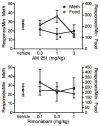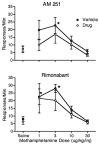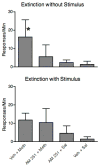Effects of cannabinoid receptor antagonists on maintenance and reinstatement of methamphetamine self-administration in rhesus monkeys
- PMID: 20153314
- PMCID: PMC2974174
- DOI: 10.1016/j.ejphar.2010.02.005
Effects of cannabinoid receptor antagonists on maintenance and reinstatement of methamphetamine self-administration in rhesus monkeys
Abstract
Cannabinoid receptor antagonists have shown some promise as treatments capable of reducing abuse and relapse to a number of abused drugs. In rodents, such effects have been observed with methamphetamine self-administration. However, the effects of cannabinoid receptor antagonists on methamphetamine self-administration and relapse have not been studied in primates. In the present study, rhesus monkeys were trained to respond on a three-component operant schedule. During the first 5-min component, fixed-ratio responses were reinforced by food, during the second 90- or 180-min component fixed-ratio responses were reinforced by i.v. methamphetamine. The third component was identical to the first. There was a 5-min timeout between each component. The effects of the cannabinoid receptor antagonists AM 251 and rimonabant were tested at various doses against self-administration of 3microg/kg/injection methamphetamine, and 1mg/kg AM 251 and 0.3mg/kg rimonabant were tested against the methamphetamine dose-effect function. The 1mg/kg dose of AM 251 was also tested for its ability to alter reinstatement of extinguished self-administration responding. The cannabinoid receptor antagonist AM 251 was found to reduce methamphetamine self-administration at doses that did not affect food-reinforced responding. The cannabinoid receptor antagonist rimonabant had similar, but less robust effects. AM 251 also prevented reinstatement of extinguished methamphetamine seeking that was induced by re-exposure to a combination of methamphetamine and methamphetamine-associated cues. These results indicate that cannabinoid receptor antagonists might have therapeutic effects for the treatment of methamphetamine dependence.
Copyright 2010. Published by Elsevier B.V.
Figures



References
-
- Anggadiredja K, Nakamichi M, Hiranita T, Tanaka H, Shoyama Y, Watanabe S, Yamamoto T. Endocannabinoid system modulates relapse to methamphetamine seeking: possible mediation by the arachidonic acid cascade. Neuropsychopharmacology. 2004;29:1470–1478. - PubMed
-
- Beardsley PM, Thomas BF, McMahon LR. Cannabinoid CB1 receptor antagonists as potential pharmacotherapies for drug abuse disorders. Int Rev Psychiatry. 2009;21:134–142. - PubMed
-
- De Vries TJ, Schoffelmeer AN. Cannabinoid CB1 receptors control conditioned drug seeking. Trends Pharmacol Sci. 2005;26:420–426. - PubMed
-
- De Vries TJ, Shaham Y, Homberg JR, Crombag HS, Schuurman K, Dieben J, Vanderschuren LJ, Schoffelmeer AN. A cannabinoid mechanism in relapse to cocaine seeking. Nat Med. 2001;7:1151–1154. - PubMed
Publication types
MeSH terms
Substances
Grants and funding
LinkOut - more resources
Full Text Sources
Other Literature Sources
Medical

